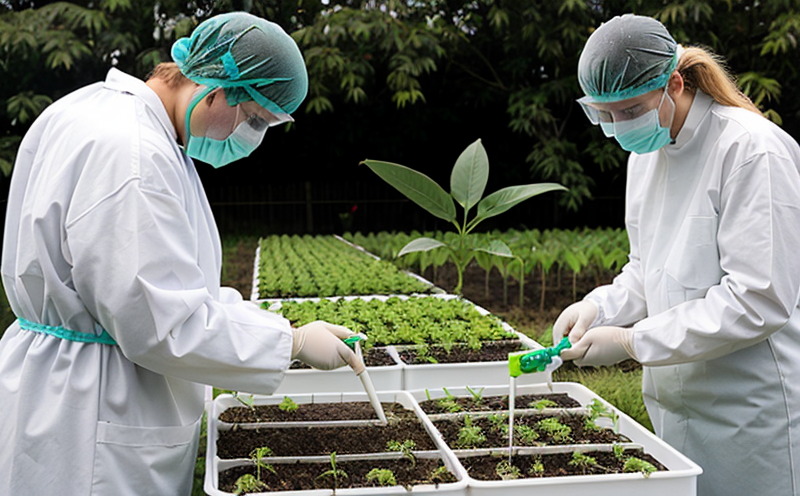Seed-Borne Bacterial Pathogen Testing
The presence of seed-borne bacterial pathogens poses significant risks to agricultural productivity and sustainability. These microorganisms can remain dormant in seeds, only manifesting symptoms during favorable environmental conditions leading to yield losses, reduced crop quality, and economic impacts on farmers.
Seed-borne bacteria such as Xanthomonas, Erwinia, Pseudomonas, among others, are known for their ability to cause diseases that affect various plant parts including leaves, stems, roots, and seeds. Efficient detection of these pathogens before planting is critical in preventing the spread of infection within a crop population.
At our laboratory, we employ advanced molecular biology techniques like Polymerase Chain Reaction (PCR) and Next-Generation Sequencing (NGS) to accurately identify bacterial pathogens present in seed lots. Our testing methodology ensures that each sample undergoes rigorous processing steps from initial sampling to final result reporting. We utilize state-of-the-art equipment and follow internationally recognized standards such as ISO 16140 for PCR-based pathogen detection.
The process begins with meticulous collection of seeds followed by thorough cleaning and extraction procedures aimed at preserving the integrity of potential bacterial colonies. Once isolated, cultures are subjected to genetic analysis using specific primers targeting unique regions of known pathogens' genomes. This approach allows us to differentiate between closely related species which might otherwise be indistinguishable through traditional culture methods.
Our comprehensive testing protocol also includes quantification measures where applicable, ensuring that not only presence but also concentration levels are accounted for in our findings. Reporting is done promptly after analysis, providing stakeholders with actionable insights they can use towards making informed decisions about seed quality assurance programs.
By offering this specialized service, we aim to support agricultural practices aimed at enhancing food security and economic stability by reducing risks associated with seed-borne pathogens. Our commitment to precision science ensures that farmers benefit from healthier crops capable of thriving under optimal conditions despite challenging environmental factors.
Why It Matters
The importance of detecting seed-borne bacterial pathogens cannot be overstated in today's agricultural landscape. Early identification allows for proactive management strategies aimed at minimizing the spread of disease within cultivated fields. This not only protects current crop cycles but also safeguards future generations of seeds produced from treated plants.
From a regulatory perspective, compliance with international standards and guidelines ensures that imported seed lots meet stringent quality benchmarks set forth by governing bodies worldwide. By adhering to these regulations, we contribute towards maintaining the integrity of global trade networks while promoting best practices among local producers.
The economic implications extend beyond immediate savings for individual farmers; large-scale implementation can lead to broader benefits such as increased market share for compliant suppliers and reduced healthcare costs linked to treatment of plant diseases. Additionally, sustainable agriculture initiatives are supported by effective pathogen control measures, fostering long-term environmental health alongside improved productivity.
Customer Impact and Satisfaction
Our clients appreciate the reliability and accuracy of our seed-borne bacterial pathogen testing services, which have helped them make more informed decisions regarding their supply chains. By leveraging our expertise in advanced molecular diagnostics, they gain confidence knowing that only high-quality seeds are being introduced into production processes.
Clients often report increased yields and improved crop uniformity following successful implementation of our recommendations based on test results. This leads to enhanced profitability for growers who can focus resources more efficiently on growing healthier plants rather than battling persistent infections throughout their growing cycles.
Moreover, satisfied customers frequently commend us for providing clear communication throughout the testing process, ensuring transparency regarding any potential issues discovered during analysis. Such open dialogue fosters trust between service providers and recipients, creating lasting partnerships built upon mutual respect and shared goals.
Environmental and Sustainability Contributions
Incorporating seed-borne bacterial pathogen testing into agricultural practices plays a crucial role in promoting environmental sustainability. By preventing the introduction of harmful microorganisms into newly planted areas, we help preserve natural ecosystems that would otherwise be disrupted by invasive species.
The reduction in chemical usage associated with preventive measures against pathogens contributes significantly to lowering greenhouse gas emissions typically generated during conventional pest control methods. Furthermore, supporting sustainable farming practices through effective pathogen management aligns closely with broader initiatives aimed at mitigating climate change impacts across various sectors.
Additionally, our services play an integral part in fostering biodiversity within cultivated lands by encouraging the growth of diverse plant communities resilient enough to withstand challenges posed by changing climates and increased pest pressure. This holistic approach supports long-term ecological balance while enhancing overall productivity levels.





